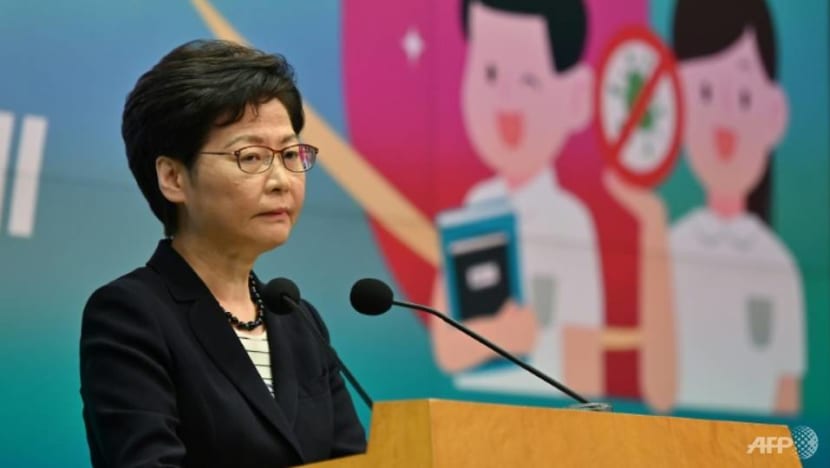Commentary: What Hong Kong’s next leader can take away from Carrie Lam’s tumultuous term
Hong Kong Chief Executive Carrie Lam’s term will be remembered for violent anti-government protests and stringent pandemic measures. Her successor will face similar challenges, says Singapore University of Social Sciences’ Yew Chiew Ping.

SINGAPORE: With the announcement she would not seek a second term, Hong Kong’s political leader Carrie Lam joined the ranks of all the preceding chief executives since the 1997 handover – Leung Chun-ying, Donald Tsang and Tung Chee-hwa – who did not serve two full terms.
Lam’s predecessor Leung assumed office in 2012 with low public support and 57.8 per cent of the votes in a “small-circle election” of the 1,193-member Election Committee. Lam fared slightly better in 2017, with 65 per cent.
Given how deeply unpopular Leung was, few would have imagined how Lam could turn out to be far more disliked.
Leung’s term was marked by the 2012 youth-led protests against Chinese national education classes, the watershed 2014 Umbrella Movement and the rise of Hong Kong localists in the 2016 Legislative Council polls. But the social tumult paled in comparison to Lam’s term.
So eventful has been Lam’s tenure that the embattled leader’s support rating plummeted to 19.2, a historical low in 25 years since 1997. The career bureaucrat’s public support rating plunged in 2019 over her attempt to fast-track the highly controversial Extradition Law Amendment Bill that would have allowed the transfer of criminal suspects in Hong Kong to mainland China to face trial.
Carrie Lam’s key failing then was misreading public sentiments: Public opinion polls have shown a steady decline in both Hong Kongers’ trust in Beijing and their confidence in the “one country, two systems” policy since 2009.
The proposed amendments to the Extradition Law laid bare the trust deficit in the Chinese government and drew hundreds of thousands to the streets. Violent and widespread clashes between protesters and the police roiled the city for months, subsiding only with the COVID-19 outbreak.
While there is little question that the push for the Extradition Bill was a calamitous miscalculation on Lam’s part, her administration likely had little say in the passage of the sweeping National Security Law in 2020 or adherence to Beijing’s zero-COVID policy over the last two years.
Lam has had to govern amid broad socio-political trends she has little control over – a growingly divisive Hong Kong society and an increasingly authoritarian China.
HONG KONG’S POLARISATION
In the years after the handover, confidence in “one country, two systems” was undermined by a stalemate in democratisation, Beijing’s increasing intervention and erosion of the autonomy that the model was supposed to provide. The landmark 2003 July rally set forth a post-materialist shift in values and was believed to have been a key trigger for Tung Chee-hwa’s resignation, boosting Hong Kongers’ sense of political efficacy.
Related:
Accumulated grievances over declining social mobility and rising inequality in the face of unaffordable housing and high costs of living, amid rapid socio-economic integration between the city and mainland China, further fed into Hong Kongers' disenchantment with the system.
The result is a polarised society, evident in the frequent clashes and tensions between the pro-government and pro-democracy camps.
To her credit, Lam did attempt to address the city’s longstanding housing issue, by adding 96,500 public housing units during her term, a 30,000 increase compared to the previous five-year period.
But it is obviously not a problem that could be resolved over five short years. The prices of flats doubled again in 2019 and the homeownership ratio slid to a 20-year low of 49.8 per cent. Among younger people aged below 35, homeownership plunged from 22.1 per cent to 7.6 per cent in 23 years.
CHINA'S TIGHTENING GRIP
Since his ascension to power in November 2012, President Xi Jinping has taken China down a more authoritarian and nationalistic path. Beijing has tightened its reins on everything from the media to its nascent civil society, clamping down on lawyers, activists, tech companies and celebrities.
This is mirrored in Hong Kong, such as in the disappearance of bookseller Gui Minhai, the winding up of jailed tycoon Jimmy Lai’s media group and the prosecution of prominent democracy activists and politicians.
Xi is expected to cement his power by securing an unprecedented third term later this year, breaking China’s established system of leadership succession since Deng Xiaoping. To this end, Xi will not allow developments in Hong Kong to derail his ambitious plan. The passage of the National Security Law by China’s rubber-stamp legislature is just a means to this end.
The zero-COVID policy is another issue. In lockstep with China, Hong Kong has also been pressured to stick to a zero-COVID strategy over the last two years, despite detriments to its financial hub status. China has proclaimed its zero-COVID strategy as superior to the endemic approach of “living with COVID-19”, and framed the two approaches as a contest between its political system and Western systems.
Before the easing of curbs in April, Hong Kong had maintained stringent border rules, blocking non-residents from entry, banning flights from “high-risk” countries and enforcing 21-day quarantines.
Carrie Lam has acknowledged that the city was seeing a “brain drain”. The harsh measures have prompted an exodus, on top of an ongoing wave of migration after the imposition of the National Security Law, with a net outflow of more than 134,000 people by mid-March.
LESSONS FOR THE NEXT LEADER
John Lee, the sole candidate backed by Beijing, looks set to succeed Lam as Hong Kong’s next Chief Executive.
As chief of the Security Bureau, Lee played a key role in the push for the Extradition Bill in 2019. Lee also said that enacting Hong Kong’s own security law, Article 23, will take priority after he assumes office.
The legislation of Article 23, which outlaws acts of treason, sedition, theft of state secrets and foreign political influences, has been shelved since the massive protest in 2003.
Now that Hong Kong’s pro-democracy lawmakers had been disqualified and removed, the controversial bill is expected to sail through the city’s legislature stacked with Beijing loyalists. However, an opposition-free legislature could be a double-edged sword as it means the next administration no longer has opposition lawmakers to blame for any policy missteps.
In his candidacy announcement, Lee vowed to resolve chronic issues such as housing, healthcare and youth development through “actively engag[ing] different sectors of the community” in making policies.
Yet many established sectoral communities in Hong Kong have ceased to exist after the National Security Law came into force. More than 50 pro-democracy civil society organisations disbanded last year, including the 47-year-old Hong Kong Professional Teachers Union, the 31-year-old Hong Kong Confederation of Trade Unions, Civil Human Rights Front and numerous independent media and student groups.
But as lessons from the Extradition Bill show, ignoring opposing voices comes at a high cost.
Clampdowns and bulldozing through unpopular policies through legislature do not put an end to deep-rooted unhappiness with the government and the system, without viable long-term plans to effectively resolve Hong Kong’s chronic housing and healthcare issues.
The next Hong Kong administration should understand that all governments need popular support. There is no knowing when seething discontent in society may reach a boiling point again.
Dr Yew Chiew Ping is head of Contemporary China Studies at the Singapore University of Social Sciences.

















